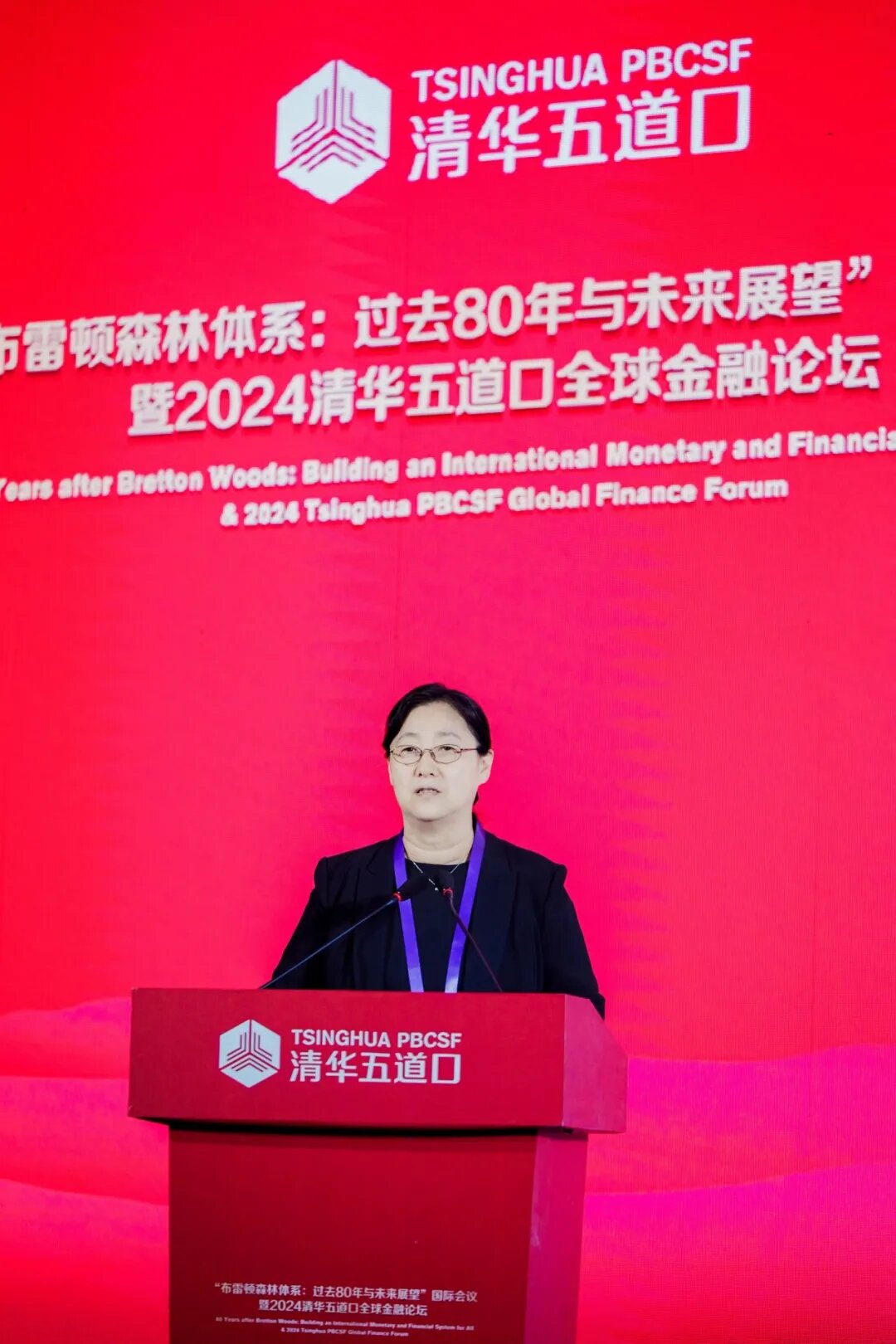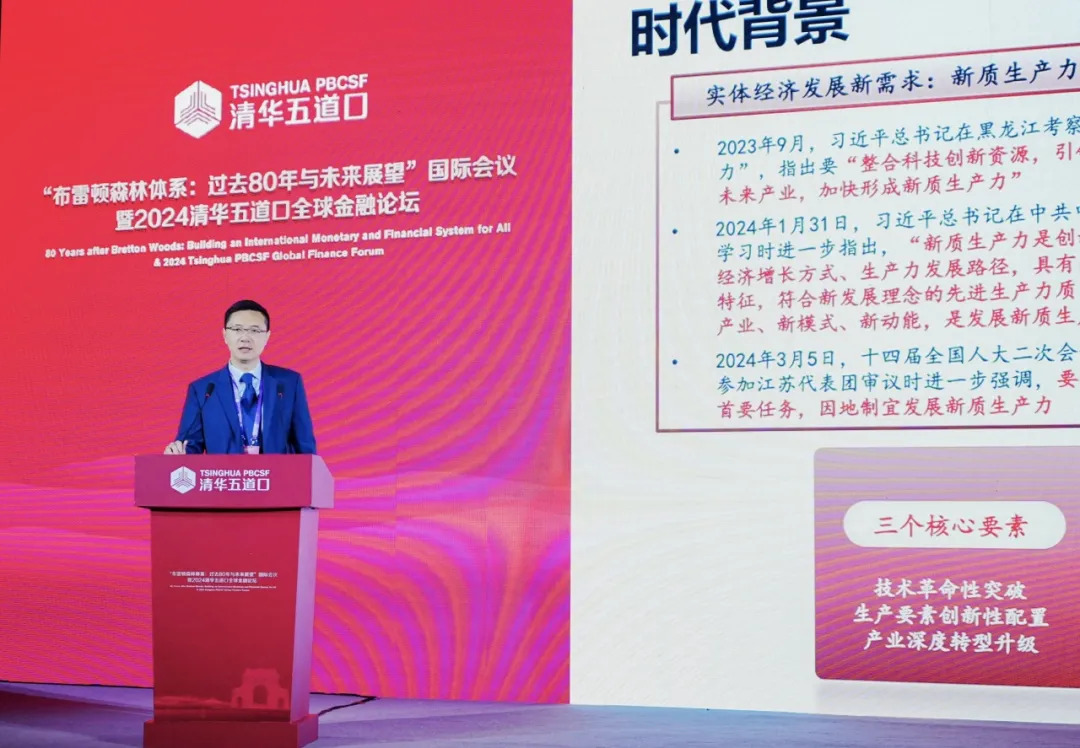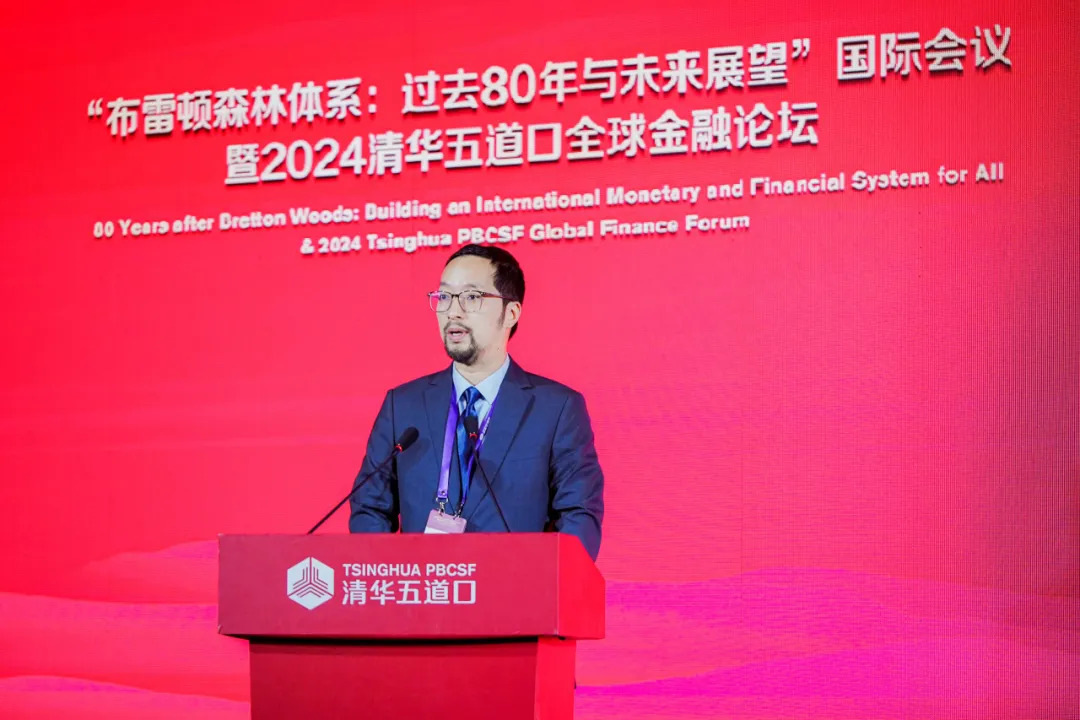The plenary session II of the 2024 Tsinghua PBCSF Global Finance Forum, themed "Finance Empowering Technology Innovation," convened distinguished experts to examine the pivotal role of finance in driving technological innovation and fostering economic growth. LIU Bibo, Associate Professor and Assistant Dean, Tsinghua PBCSF moderated the session while ZHANG Xiaohui, Vice President, China Society for Finance and Banking, TIAN Xuan, Chair Professor and Associate Dean, Tsinghua PBCSF and LI Kang, Secretary-General, Jianxin (CCB) Leadership Strategic Emerging Industries Development Fund Expert Advisory Committee; Former Director, Department of Laws and Regulations, Department of Employment, Income Distribution and Consumption, National Development and Reform Commission made keynote speeches.

The picture shows Xiaohui Zhang delivering a keynote speech
Zhang Xiaohui began her keynote speech by revisiting the four industrial revolutions as a backdrop, summarizing the critical importance of technological innovation for national development and security. "The level of technological innovation in key areas can determine a nation's fate and the shaping of international rules. It is also a decisive factor for a nation to overcome the middle-income trap," Zhang Xiaohui stated. She noted that the current new technological revolution has entered an era of geo-technology, where only countries that lead in critical technological fields can prevail in international competition. Against this backdrop, using finance to accelerate the optimization of resource allocation and to foster the development of new quality productivity is both essential and urgent.
Based on an analysis of the financial supply system, Zhang Xiaohui pointed out that China's current bank-dominated indirect financing system still shows a significant mismatch with the demands of technological innovation. "Although our total capital investment is substantial, it has structural problems." She explained that this is because technological innovation involves high input, high uncertainty, and long cycles, and the financing needs of various innovation entities and activities differ from those of traditional production activities.
Regarding the perfection of a financial system for science and innovation with Chinese characteristics, Zhang Xiaohui highlighted five key recommendations: Firstly, a robust financial ecosystem is needed, especially considering the varying characteristics of science and innovation projects at different stages of their lifecycle, which require different forms of financial support. "Science and innovation are immensely complex and unpredictable; capital naturally seeks profit, and only the market can provide sufficient incentives." Zhang Xiaohui expressed that public sector support for science and innovation financing should primarily focus on enhancing the financing and ecological environment for innovation.
Secondly, she suggested adjusting the investment strategy of government-guided funds, "Government-guided funds should focus on co-investing with good risk and private equity funds," Zhang Xiaohui said. Moreover, in terms of vigorously developing direct financing, she advised efforts to construct a multi-level capital market, improve the operational mechanisms of the GEM and STAR Market, further optimize the trading ecosystem of the New Third Board, and actively promote the development of private equity funds. In optimizing indirect financing services for science and innovation, there should be a system that adapting to the financing needs of the tech-innovation sector, including advancing the construction of financial intermediaries within the information service platform. Additionally, a risk compensation mechanism suited to the light asset, high-risk nature of the tech industry is also necessary.

The picture shows Xuan Tian delivering a keynote speech
Finance is the lifeblood of a country's economic development and acts as a catalyst and driving force for high-quality economic growth. Especially against the backdrop of accelerated international technological competition and the transformation of domestic economic development modes, enhancing the efficiency of financial services to the real economy has become a key issue in the new round of economic reforms. In his keynote speech titled "Promoting New Quality Productivity Through Science and Technology Finance," Tian Xuan emphasized the importance of accelerating the development of science and technology finance to advance economic structural transformation by comparing the 45-year trend data of GDP between China and the USA.
"To develop new quality productivity, we need to enhance the national characteristics of science and innovation, allowing the highest quality, most innovative, and growth-oriented enterprises to be listed in our country and to support them with financial strength, which is very important," Tian Xuan stated. He believes that private enterprises play a particularly prominent role in technological innovation. "To boost the confidence of private enterprises, short-term support relies on 'hard support' from policies such as funding and projects; in the long term, it depends more on 'soft support' from reforms, including a fair competitive environment, a legalized business environment, and the predictability, stability, and consistency of policies," Tian Xuan expressed.
Based on an analysis of the inherent laws of innovation, Tian Xuan summarized several essential elements that a robust science and technology finance system should possess. On a micro level, there should be a culture that tolerates failure, innovative venture capital organizational forms, and proper human resource policies; on a middle level, there should be a 'not too active' secondary market, including strong 'anti-hostile takeover' clauses, institutional investors with longer holding periods, and fewer analyst tracks. "From a macro perspective, it is necessary to perfect the legal environment, protect private entrepreneurs, and safeguard property, intellectual property, and investor rights," stated Tian Xuan. Additionally, a healthy and open capital market is needed to vigorously develop direct financing and 'patient' capital, along with stable macro policy orientations, providing the market with continuous, stable, and consistent expectations, enabling entrepreneurs to make long-term investments without short-term disruptions.
Following last year's Central Economic Work Conference, which first proposed "encouraging the development of venture capital and equity investment," this year's Government Work Report has emphasized "encouraging the development of venture capital and equity investment, optimizing the functions of industrial investment funds" as crucial support for vigorously advancing the construction of a modern industrial system and accelerating the development of new quality productivity. As an important force in direct financing, private equity venture capital funds are playing an increasingly significant role in promoting the formation of innovation capital and supporting technological innovation. In this regard, Li Kang shared his views on "Private Equity Investment Empowering Innovative Development, Promoting High-Level Technological Self-Reliance and Self-Strengthening." "Strategic emerging industry investment is undergoing significant or structural changes; investing now is entirely different from five or even ten years ago." Based on an analysis of industry data, Li Kang outlined three new trends in industrial investment: the continuous growth in total volume, dynamic changes in structure, and the constant increase and forward movement of new tracks.

The picture shows Kang Li delivering a keynote speech
"In the future, private equity investment funds will become integrated into the main battleground of the national economy." Li Kang believes that in 2024, private equity investments will continue to face the external circumstances of ongoing industrial transformation and accelerated shifts in market structures. To expedite the development of China's private equity market, Li Kang suggests efforts need to be made from both the policy and market participant perspectives. From the policy supply side, apart from optimizing the supervision of government-guided funds, there should be a focus on a comprehensive registration system to further perfect the construction of a multi-level capital market. In particular, it is crucial to accelerate the integration of regional equity markets with higher-level capital markets, creating broader exit channels and spaces for venture and equity investments.

The picture shows Bibo Liu hosting the meeting
From the market participant perspective, Li Kang advises that equity investment institutions should proactively adapt to new changes by focusing on the following areas: Firstly, they should assess the macroeconomic situation and stay attuned to policy changes. Li Kang believes that following recent central key meetings and documents, the areas to focus on include: leading industries represented by intelligent networked new energy vehicles; three emerging industries, namely hydrogen energy, new materials, and innovative pharmaceuticals; three new growth engines, namely bio-manufacturing, commercial aerospace, and the low-altitude economy; two new tracks, namely quantum technology and life sciences. "Equity investment institutions must also respond to market changes and perfect their investment strategies, especially by keeping pace with the integration trends of industry, education, and research, continually optimizing their investment toolkits," Li Kang says.